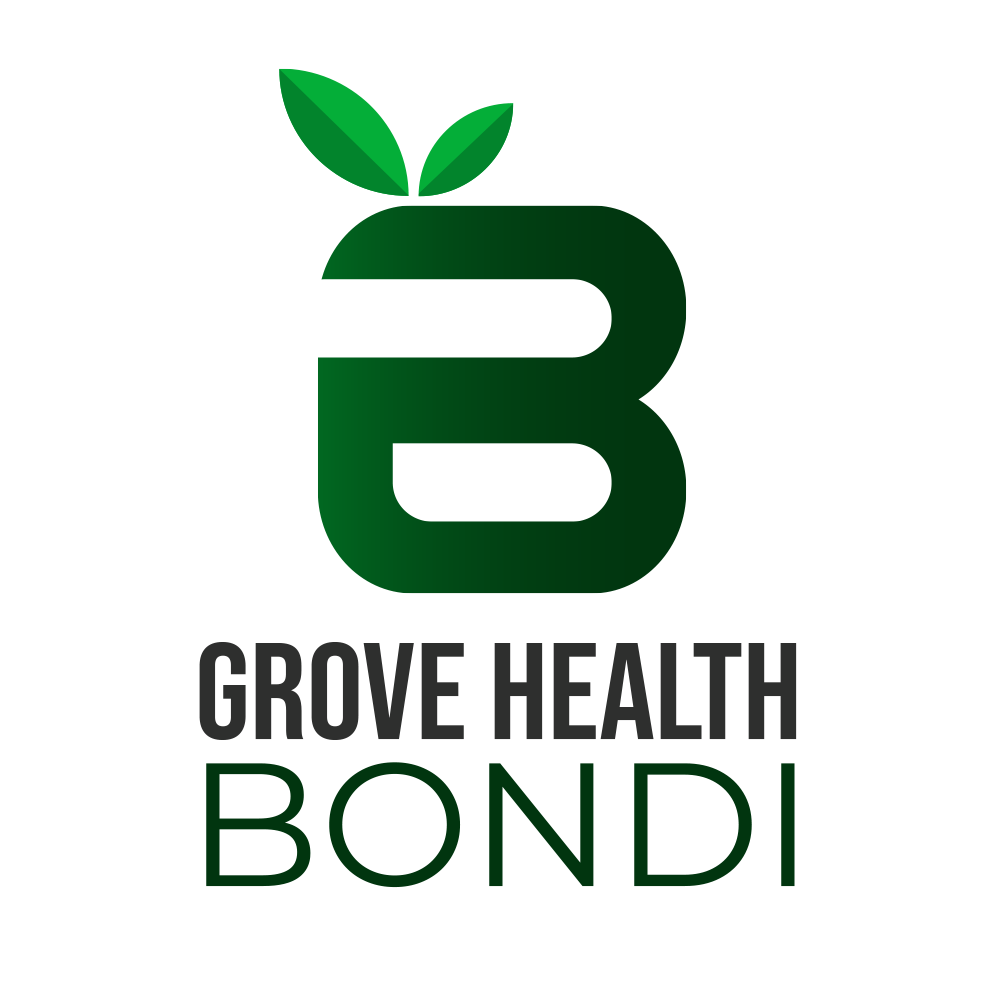Corn is often favored by many for its delicious taste and the essential nutritional value it provides to the body. Although it’s a rich source of energy due to its abundant starch content, many people pursuing a healthy lifestyle and wanting to control their weight often wonder if corn is suitable for their diet. Let’s clarify this common question with Grove Health Bondi: “Is Corn Good for Weight Loss?” and discover the ways to consume corn that are both appropriate and effective for weight loss.
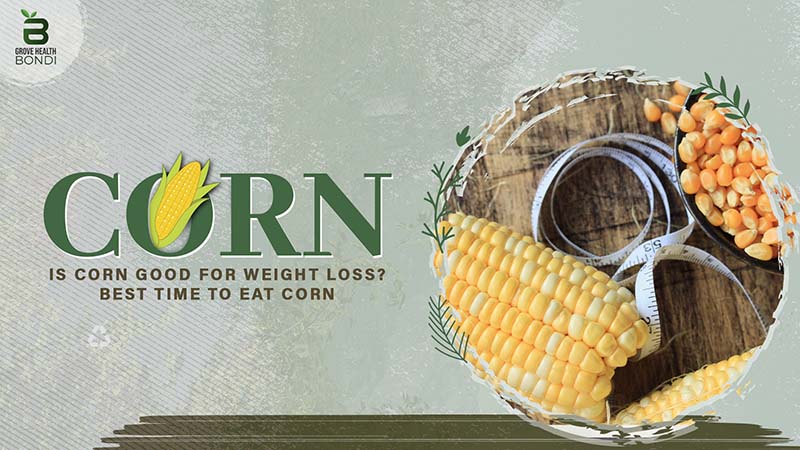
1. Nutritional Composition of Corn
Corn is a whole grain rich in fiber, vitamins, carbs, and several other essential minerals. According to data from the United States Department of Agriculture, 164 grams of sweet yellow corn contains:
- Calories: 177
- Protein: 5.4 grams
- Fat: 2.1 grams
- Carbs: 41 grams
- Fiber: 4.6 grams
- Vitamin C: 17% DV
- Potassium: 10% DV
- Magnesium: 11% DV
- Thiamine (vitamin B1): 24% DV
- Folate (vitamin B9): 19% DV.
With such a rich nutritional composition, incorporating corn into your daily diet is an excellent choice. Notably, corn is gluten-free, making it suitable for those with Celiac disease.
However, despite corn’s high nutritional value, individuals with certain health conditions should limit their consumption of corn-based processed products like syrup and refined oil, as most of the essential nutrients and fiber are removed during production.
Moreover, the way corn is prepared and consumed can also affect its nutritional value. For instance, fresh corn usually contains more vitamin C compared to dried corn, while dried corn typically provides more fiber than fresh corn.
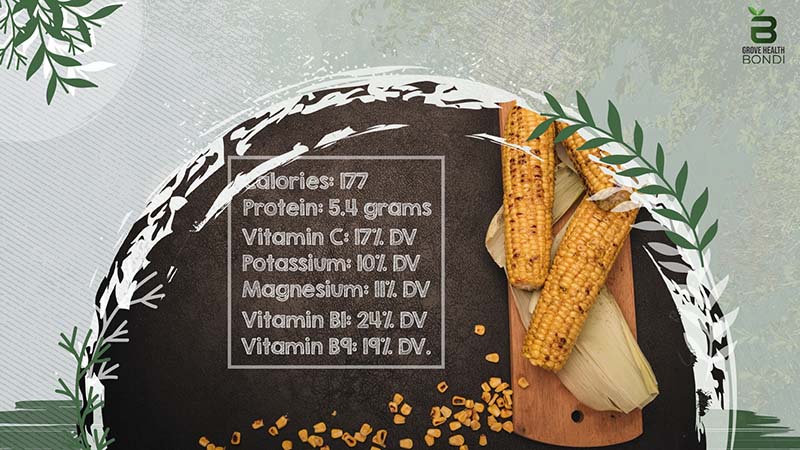
2. Health Benefits of Eating Corn
Corn is a significant source of many essential minerals and nutrients. Here are some potential health benefits that corn provides.
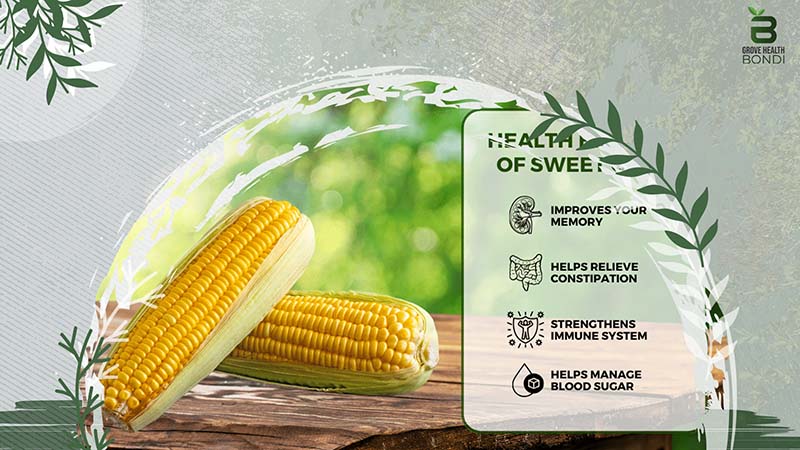
2.1 Good for Vision
Corn, a familiar food in our daily lives, contains a large amount of lutein – a type of carotenoid that functions similarly to vitamin A. Lutein has the potential to help reduce the risk of eye diseases such as cataracts, macular degeneration, and many others. Therefore, regular consumption of corn can help protect your eyes from various health risks.
2.2 Enhances Digestive Health
Corn contains a significant amount of fiber. This fiber not only supports the smooth operation of the digestive system, helping to prevent issues such as constipation and reducing the risk of hemorrhoids, but it also serves as an effective “weapon” for those pursuing weight loss goals.
The fiber in corn helps prolong the feeling of fullness, thereby reducing calorie consumption. This is very important for weight control.
Nutrition experts recommend that each person should consume between 22.4 to 33.6 grams of fiber per day, depending on gender and age. Therefore, add corn to your menu to provide the necessary amount of fiber for your body, while also supporting your weight loss process.
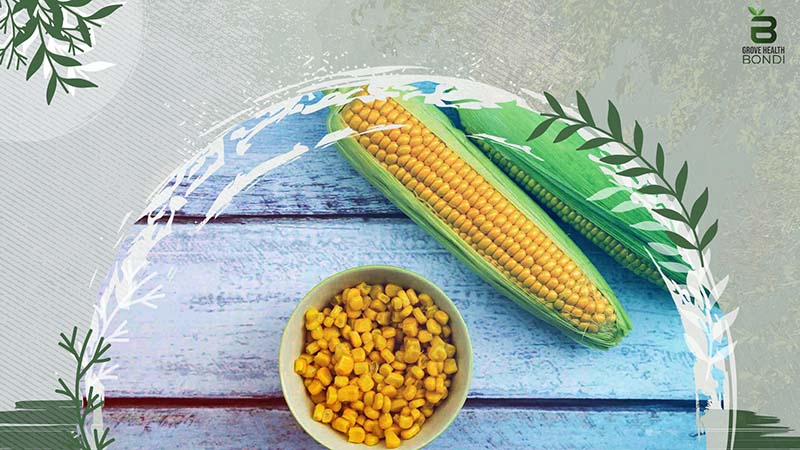
2.3 Strengthens Bones
Corn is a valuable source of nutrition, including calcium, magnesium, and vitamin K, all of which play a crucial role in protecting and enhancing bone health. However, maintaining bone health is not solely dependent on consuming corn. To have a robust skeletal system, you need to have a diverse diet, including other foods rich in calcium. In addition, regular exercise is also necessary to strengthen bone health. Limiting alcohol consumption is also an important factor in protecting bones.
2.4 Provides Vitamin C to the Body
Sweet corn is a rich source of vitamin C, which helps enhance antioxidant capabilities and protect the body’s cells from the harmful attack of free radicals.
In particular, corn also contains a large amount of vitamin B, including thiamin (vitamin B1), folate (vitamin B9), niacin (vitamin B3), riboflavin, pantothenic acid, and vitamin B6. These vitamins play a crucial role in energy production, helping the brain and nervous system function stably.
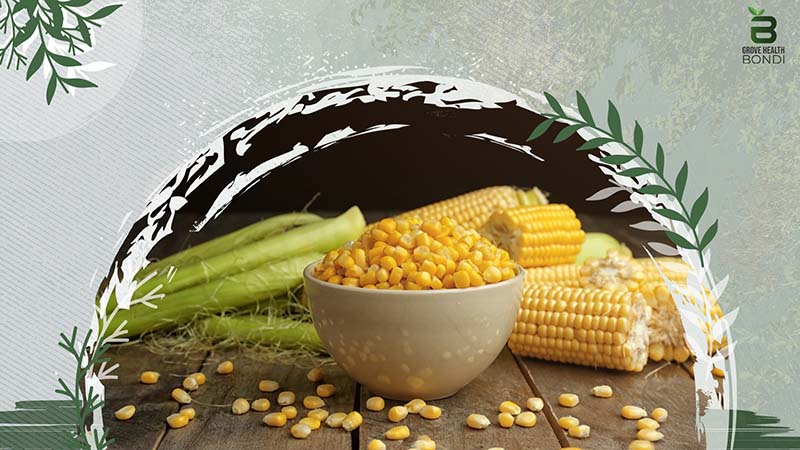
2.5 Corn as a Source of Carbs for Energy
Corn contains complex carbohydrates, a type of carbs that are good for health and derived from plants. These carbs play an essential role in supporting energy production for metabolic activities in the body. They help provide energy for vital organs such as the brain, kidneys, heart, and nervous system.
A serving of sweet corn, about 100 grams, will provide approximately 19 grams of carbs. This is important, as the recommended daily intake of carbs for each person is 130 grams. Thus, corn can be a significant part of your daily diet, helping to provide the necessary energy for your body.
2.6 Helps Control Cholesterol, Reducing Risk of Cardiovascular Diseases
Corn with its abundant fiber content, not only helps improve the digestive system but also effectively supports in reducing bad cholesterol. Importantly, corn has the ability to lower blood sugar levels, which is very beneficial for people with diabetes.
In addition, corn contains vitamin B, an important type of vitamin that helps the body fight against dangerous conditions such as stroke and heart attack. Therefore, adding corn to your daily diet is a smart choice to maintain good health.
2.7 Eating Corn Aids in Weight Loss
Corn is becoming a top choice for those pursuing weight loss goals. Here are some reasons why corn can effectively support the weight loss process:
- Low in Calories: Every 100 grams of corn contains only about 85.6 kcal, a relatively low calorie content compared to many other foods such as rice, noodles, or bread.
- Rich in Fiber: Corn contains a large amount of fiber, which helps you feel full longer and reduces hunger. Moreover, fiber also helps reduce the risk of constipation and limits cholesterol absorption.
However, to ensure health and effective weight loss, you should combine corn with other types of food in your diet.
3. Caloric Content in Corn
Corn with its low calorie content, plays a crucial role in supporting weight loss. Specifically, 100 grams of corn contains only about 86 calories. If you consume a cup of corn (approximately one cup), your body will receive about 132 calories. However, it’s important to note that the actual calorie content can vary depending on the preparation method and any added ingredients. For instance, adding butter to corn will increase the calorie and fat content.
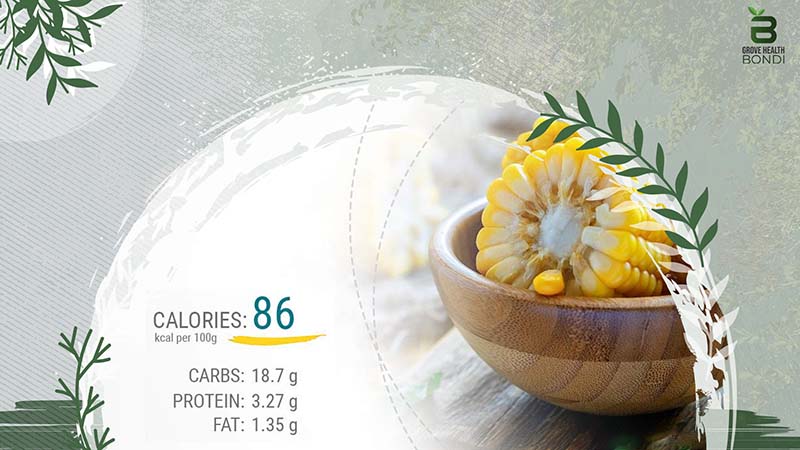
4. Are Corn Good for Weight Loss?
Yes, corn can be a good choice for weight loss as it is low in calories and high in fiber. Fiber helps you feel full longer, reduces hunger, and limits cholesterol absorption. However, corn also contains a relatively high amount of natural sugars, so if you are following a strict weight loss diet, you might want to limit the amount of corn in your diet.
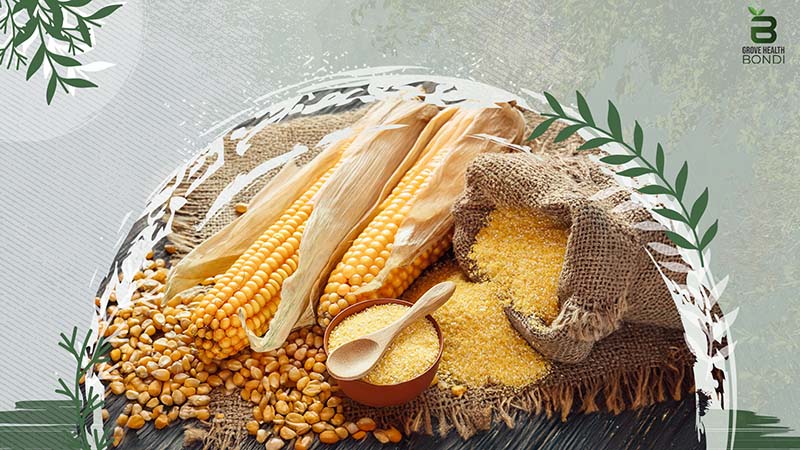
5. Optimal Time to Eat Corn for Weight Loss
To optimize weight loss, eating corn in the morning is the best choice. The reason is that at this time, the acid concentration in the stomach is high, helping to digest corn effectively. Moreover, corn contains a large amount of cellulose, a type of fiber that can stimulate the digestive system to work vigorously.
However, remember that weight loss is not only based on food choices but also needs to be combined with regular physical exercise and maintaining a healthy lifestyle. If you have any questions or concerns, discuss them with your doctor or nutritionist.
6. Effective Ways to Incorporate Corn into a Weight Loss Diet
Here are some effective methods to integrate corn into your weight loss diet:
- Add corn to salads: Adding corn to salads not only enhances the flavor but also provides additional fiber, helping you feel full longer.
- Combine corn with other vegetables: You can add corn to stir-fried vegetables or cook it with other vegetables to increase nutritional value.
- Use corn as a snack: Boiled corn, grilled corn, or popcorn (without added butter) are good snack options between meals.
- Corn in soups or stews: Adding corn to soups or stews can enhance the flavor and nutritional value.
- Control portion sizes: Although corn is beneficial for weight loss, you still need to adjust your portion sizes to avoid weight gain from overeating.
- Avoid processed corn products: Processed corn products often contain a lot of fats and sugars, so they are not good for weight loss.
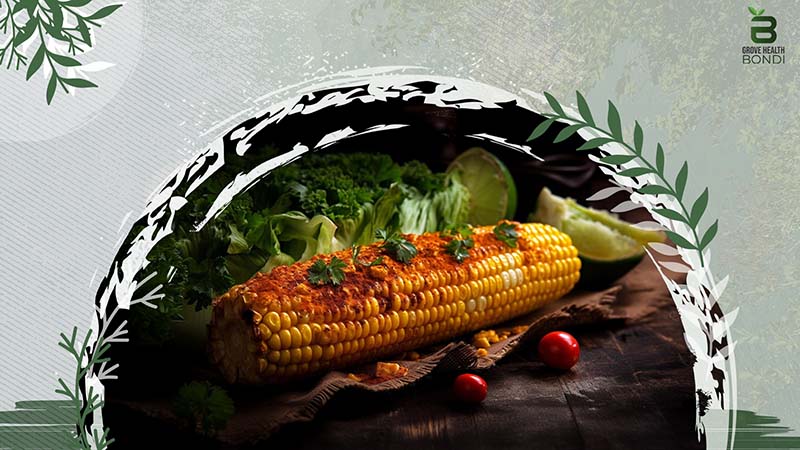
7. Considerations When Using Corn for Weight Loss
Corn is a rich source of nutrition and can be a significant part of a weight loss diet. However, to achieve the best results, you need to consider the following:
- Choose quality corn: Look for corn with green husks, fresh leaves, and no dryness. Avoid choosing corn that is too young or too old, as it may not taste good. You can gently press the corn kernels to check their softness.
- Eating time: Avoid eating corn after 7 pm. The reason is that after this time, the body’s digestive ability decreases, which can cause problems with the digestive system.
- Consideration about fats: Corn contains omega-3 but also has a lot of omega-6. This imbalance can harm the body and easily lead to chronic diseases.
8. Conclusion
Hoping that this article has shed light on the question, “Is Corn Good for Weight Loss?” Corn is an excellent source of nutrition and can support your weight loss journey if used sensibly. If you find this information beneficial, please share it with friends and family so they can also reap the benefits of corn. And don’t forget to follow Grove Health for more valuable health insights. Wishing you success on your weight loss path!
>>See more related articles:
1. Is Oranges Good for Weight Loss? Best Time to Eat?
2. Is Grapefruit Good for Weight Loss? Benefits & Note
3. Is Oatmeal Good For Weight Loss? Is It The Best Option?
